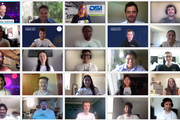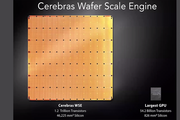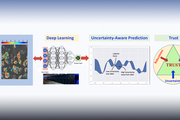Did you know we have a monthly newsletter? View past volumes and subscribe.
Accelerating the path to precision medicine
March 22, 2022 -
LLNL joined the Transforming Research and Clinical Knowledge in Traumatic Brain Injury (TRACK-TBI) consortium in 2018. The national, multiyear, multidisciplinary effort, led by the University of California at San Francisco in collaboration with Lawrence Berkeley and Argonne national laboratories and other leading research organizations and universities, combines neuroimaging, blood-based...
Machine learning model finds COVID-19 risks for cancer patients
March 10, 2022 -
A new study by researchers at LLNL and the University of California, San Francisco, looks to identify cancer-related risks for poor outcomes from COVID-19. Analyzing one of the largest databases of patients with cancer and COVID-19, the team found previously unreported links between a rare type of cancer—as well as two cancer treatment-related drugs—and an increased risk of hospitalization...
COVID-19 R&D: Computing responds to pandemic
Jan. 19, 2022 -
When the COVID-19 pandemic began, the Laboratory immediately started seeking solutions to the myriad challenges posed by the global crisis. The Computing Directorate jumped right in with research and development activities that combine molecular screening to inform antiviral drug experimentation; a generative molecular design software platform to optimize properties of antiviral drugs; an...
Unprecedented multiscale model of protein behavior linked to cancer-causing mutations
Jan. 10, 2022 -
LLNL researchers and a multi-institutional team have developed a highly detailed, machine learning–backed multiscale model revealing the importance of lipids to the signaling dynamics of RAS, a family of proteins whose mutations are linked to numerous cancers. Published by the Proceedings of the National Academy of Sciences, the paper details the methodology behind the Multiscale Machine...
LLNL establishes AI Innovation Incubator to advance artificial intelligence for applied science
Dec. 20, 2021 -
LLNL has established the AI Innovation Incubator (AI3), a collaborative hub aimed at uniting experts in artificial intelligence (AI) from LLNL, industry and academia to advance AI for large-scale scientific and commercial applications. LLNL has entered into a new memoranda of understanding with Google, IBM and NVIDIA, with plans to use the incubator to facilitate discussions and form future...
Building confidence in materials modeling using statistics
Oct. 31, 2021 -
LLNL statisticians, computational modelers, and materials scientists have been developing a statistical framework for researchers to better assess the relationship between model uncertainties and experimental data. The Livermore-developed statistical framework is intended to assess sources of uncertainty in strength model input, recommend new experiments to reduce those sources of uncertainty...
Data Science Challenge welcomes UC Riverside
Oct. 11, 2021 -
Together with LLNL’s Center for Applied Scientific Computing (CASC), the DSI welcomed a new academic partner to the 2021 Data Science Challenge (DSC) internship program: the University of California (UC) Riverside campus. The intensive program has run for three years with UC Merced, and it tasks undergraduate and graduate students with addressing a real-world scientific problem using data...
60 years of cancer research
Sept. 10, 2021 -
From studying radioactive isotope effects to better understanding cancer metastasis, the Laboratory’s relationship with cancer research endures some 60 years after it began, with historical precedent underpinning exciting new research areas. In one Cancer Moonshot project, research includes a close synergy between experiments and computation, allowing scientists to get a better picture of the...
Virtual LLNL-UC Merced Data Science Challenge tackles asteroid detection though machine learning
June 25, 2021 -
Over three weeks, students from the University of California, Merced collaborated online with mentors at LLNL to tackle a real-world challenge problem: using machine learning to identify potentially hazardous asteroids that could pose an existential threat to humanity. Throughout the event, the teams tackled problems around the theme of “Astronomy for Planetary Defense.” For the main...
Brian Gallagher combines science with service
June 20, 2021 -
Brian Gallagher works on applications of machine learning for a variety of science and national security questions. He’s also a group leader, student mentor, and the new director of LLNL’s Data Science Challenge. The Lab has enabled Gallagher to combine scientific pursuits with leadership positions and people-focused responsibilities. “For a long time, my primary motivation was learning new...
COVID-19 detection and analysis with Nisha Mulakken (VIDEO)
June 7, 2021 -
LLNL biostatistician Nisha Mulakken has enhanced the Lawrence Livermore Microbial Detection Array (LLMDA) system with detection capability for all variants of SARS-CoV-2. The technology detects a broad range of organisms—viruses, bacteria, archaea, protozoa, and fungi—and has demonstrated novel species identification for human health, animal health, biodefense, and environmental sampling...
CASC research in machine learning robustness debuts at AAAI conference
Feb. 10, 2021 -
LLNL’s Center for Applied Scientific Computing (CASC) has steadily grown its reputation in the artificial intelligence (AI)/machine learning (ML) community—a trend continued by three papers accepted at the 35th AAAI Conference on Artificial Intelligence, held virtually on February 2–9, 2021. Computer scientists Jayaraman Thiagarajan, Rushil Anirudh, Bhavya Kailkhura, and Peer-Timo Bremer led...
Lab researchers explore ‘learn-by-calibration’ approach to deep learning to accurately emulate scientific process
Feb. 10, 2021 -
An LLNL team has developed a “Learn-by-Calibrating” method for creating powerful scientific emulators that could be used as proxies for far more computationally intensive simulators. Researchers found the approach results in high-quality predictive models that are closer to real-world data and better calibrated than previous state-of-the-art methods. The LbC approach is based on interval...
What put LLNL at the center of U.S. supercomputing in 2020?
Nov. 12, 2020 -
The HPC world is waiting for the next series of transitions to far larger machines with exascale capabilities. By this time next year, the bi-annual ranking of the Top500 most powerful systems will be refreshed at the top as Frontier, El Capitan, Aurora, and other DOE systems come online. While LLNL was already planning around AI acceleration for its cognitive simulation aims and had a number...
From intern to mentor, Nisha Mulakken builds a career in bioinformatics
Nov. 3, 2020 -
The COVID-19 pandemic has sparked a wave of new research and development at the Lab, and Nisha Mulakken is very busy. The biostatistician has enhanced the Lawrence Livermore Microbial Detection Array (LLMDA) system with detection capability for all variants of SARS-CoV-2. The technology detects a broad range of organisms—viruses, bacteria, archaea, protozoa, and fungi—and has demonstrated...
AI gets a boost via LLNL, SambaNova collaboration
Oct. 20, 2020 -
LLNL has installed a state-of-the-art artificial intelligence (AI) accelerator from SambaNova Systems, the National Nuclear Security Administration (NNSA) announced today, allowing researchers to more effectively combine AI and machine learning (ML) with complex scientific workloads. LLNL has begun integrating the new AI hardware, SambaNova Systems DataScale™, into the NNSA’s Corona...
LLNL, ANL and GSK provide early glimpse into Cerebras AI system performance
Oct. 13, 2020 -
AI chip and systems startup Cerebras was one of many AI companies showcased at the AI Hardware Summit which concluded last week. Cerebras invited collaborators from LLNL, Argonne National Laboratory, and GlaxoSmithKline to talk about their early work on Cerebras machines and future plans. Livermore Computing's CTO Bronis de Supinski said, “We have this vision for performing cognitive...
Machine learning speeds up and enhances physics calculations
Oct. 1, 2020 -
Interpreting data from NIF’s cutting-edge high energy density science experiments relies on physics calculations that are so complex they can challenge LLNL supercomputers, which stand among the best in the world. A collaboration between LLNL and French researchers found a novel way to incorporate machine learning and neural networks to significantly speed up inertial confinement fusion...
Advancing healthcare with data science (VIDEO)
Aug. 3, 2020 -
This video provides an overview of projects in which data scientists work with domain scientists to address major challenges in healthcare. To help fight the COVID-19 pandemic, researchers are developing computer models to search for potential antibody and antiviral drug treatments, sharing a data portal with scientists and the general public, and analyzing drug compounds via a novel text...
LLNL papers accepted into prestigious conference
July 9, 2020 -
Two papers featuring LLNL scientists were accepted in the 2020 International Conference on Machine Learning (ICML), one of the world’s premier conferences of its kind. Read more at LLNL News.























